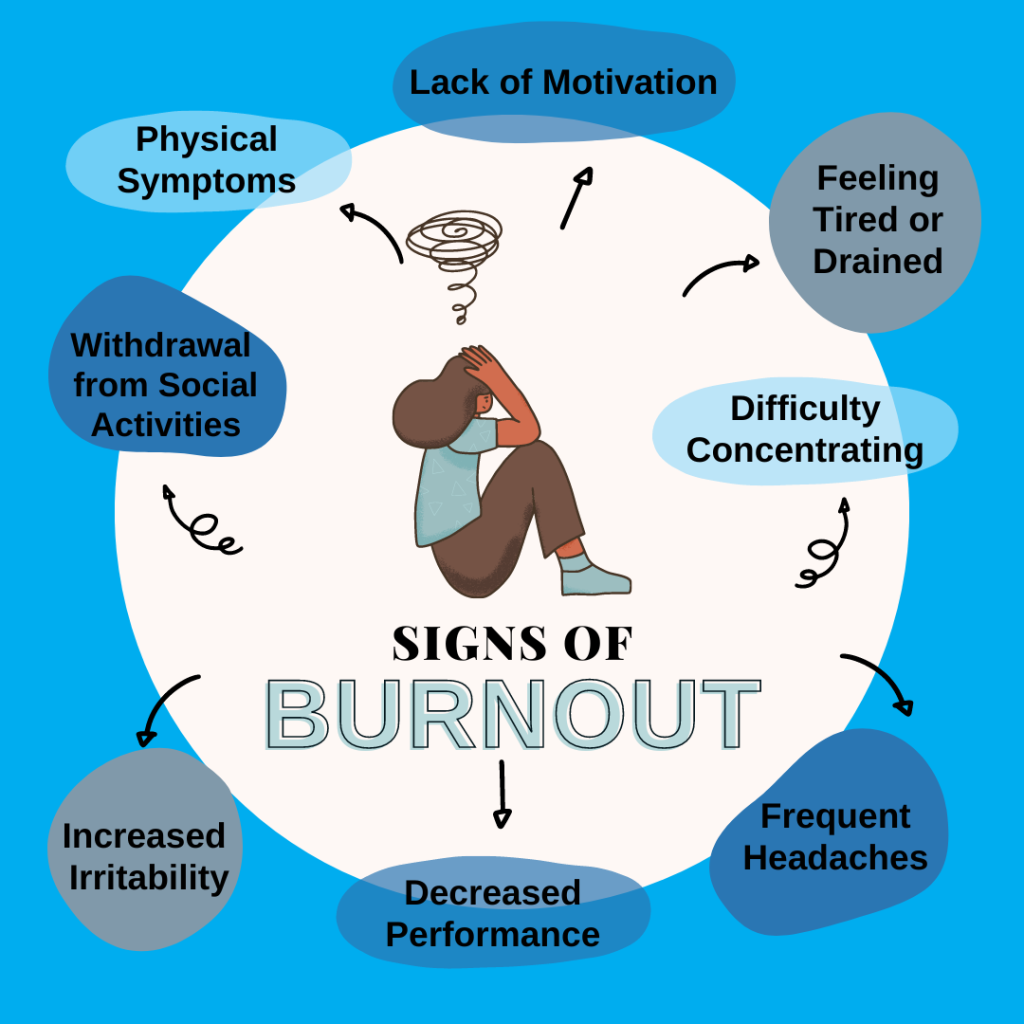As an adult learner juggling multiple responsibilities, including navigating the demands of coursework, job responsibilities, and personal life, can be challenging. While pursuing your degree is a rewarding endeavor, it’s essential to be mindful of the signs of burnout and take proactive steps to address it. Let’s explore the signs of burnout in adult learners and provide practical tips for positively managing burnout, ensuring that you stay on track to graduation.
Signs of Burnout:
- Physical and Emotional Exhaustion: Feeling constantly tired, drained, and emotionally depleted even after getting enough rest.
- Lack of Motivation: Experiencing a loss of interest and enthusiasm for coursework, extracurricular activities, and personal interests.
- Decreased Performance: Noticing a decline in academic performance, productivity, and quality of work.
- Increased Irritability and Negativity: Feeling easily frustrated, irritable, or cynical. Also having a negative outlook on life and academic pursuits.
- Withdrawal and Isolation: Withdrawing from social activities, avoiding interactions with peers, and feeling disconnected from your support network.
- Difficulty Concentrating: Struggling to focus or retain information during lectures, study sessions, or assignments.
- Physical Symptoms: Experiencing headaches, muscle tension, digestive issues, or other physical symptoms related to stress and burnout.
Tips for Dealing with Burnout:
- Recognize the Signs: Take time to acknowledge and validate your feelings of burnout. Recognizing the signs early can help you take proactive steps to address them before they escalate.
- Practice Self-Care: Prioritize self-care activities that promote physical, mental, and emotional well-being. This includes getting enough sleep, eating nutritious meals, exercising regularly, and engaging in activities that bring you joy and relaxation.
- Set Boundaries: Establish clear boundaries between your academics, work, and personal life to prevent burnout. Learn to say no to additional, unnecessary commitments and prioritize activities that align with your values and priorities.
- Seek Support: Reach out to your support network for encouragement and assistance. This can include friends, family, classmates, professors, advisor, and university resource teams like Accessibility Services. Don’t hesitate to ask for help when you need it, whether it’s for academic support, emotional support, or practical assistance.
- Take Breaks: Incorporate regular breaks into your study routine to prevent burnout and recharge your batteries. Schedule short breaks during study sessions, and take longer breaks to relax and unwind when needed. Take a two-week break between your courses. If you need a longer break, reach out to your advisor to discuss a Leave of Absence.
- Practice Stress-Relief Techniques: Explore stress-relief techniques such as deep breathing, meditation, mindfulness, yoga, or progressive muscle relaxation to help alleviate stress and promote relaxation.
- Reevaluate Your Goals: Take a step back and reevaluate your academic and personal goals to ensure they are realistic and achievable. Adjust your expectations and priorities as needed to reduce pressure and avoid burnout.
- Stay Connected: Maintain connections with peers, classmates, and professors through online forums, study groups, and virtual meetups. Building a supportive community can provide encouragement, motivation, and a sense of belonging.
- Seek Professional Help: If you’re struggling to cope with burnout on your own, don’t hesitate to seek professional help from a counselor, therapist, or mental health professional. They can provide valuable support, guidance, and resources to help you manage burnout and regain a sense of balance and well-being.
Burnout is a common experience for adult college students, but it’s essential to recognize the signs early and take proactive steps to address it. Remember, your well-being is paramount, and taking care of yourself is essential for academic success and personal fulfillment. Your Aspen support team is here to help you. Check out the Student Success Webpage to make an appointment with your advisor!
This post was made in conjunction with Aspen University’s Student Affairs team and AI generation.

